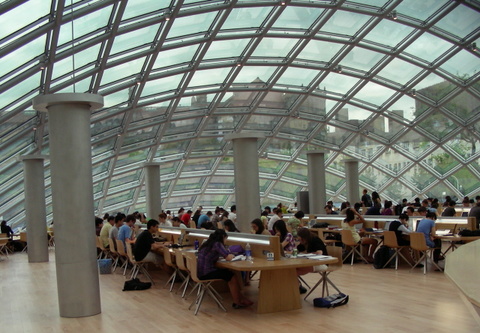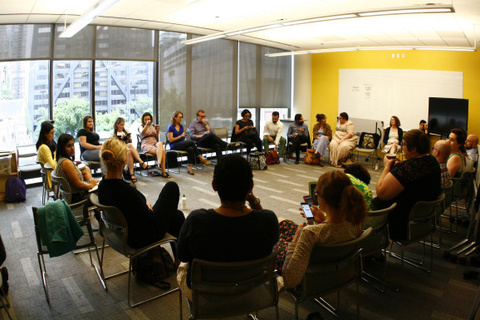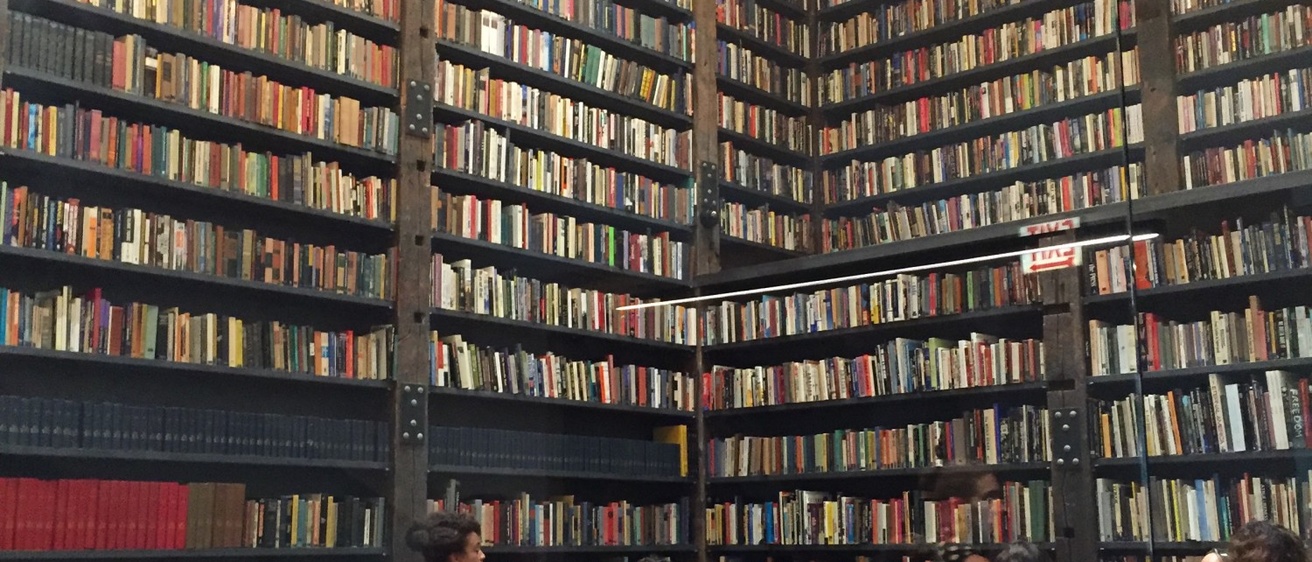Angela Toscano (English) and Anu Thapa (Cinematic Arts) were selected as Humanities Without Walls Fellows for last summer's workshop. The program is part of an Andrew W. Mellon Foundation award to the Illinois Program for Research in the Humanities (IPRH) at the University of Illinois at Urbana–Champaign to fund an extensive consortium of fifteen humanities institutes in the Midwest and beyond. Applications for the Summer 2017 Alternative Academic Career Summer Workshop for Pre-Doctoral Students in the Humanities are due to the Obermann Center by October 18. Prospective applicants can attend an information session with Toscana, Thapa, and Obermann Director Teresa Mangum on Wednesday, September 28, at 4:00 p.m. at the Obermann Center (111 Church Street).
Following are reflections on the Summer 2016 Workshop from Angela and Anu:
As students and scholars, we are often told how few jobs there are in the professoriate. We are barraged with articles and think-pieces bemoaning the crisis in the humanities, the precarious position of faculty, and the depressing reality of intellectual life in contemporary America. It is often difficult to feel that either our work or our skills are valued and valuable in our own fields or by our own advisors, let alone beyond the walls of the university. Panels organized to discuss opportunities outside of tenure-track often suffer from narrow and scarce conceptions of what a PhD in the humanities means, and what can be done with it. In short, discussions of the humanities and the market more often than not lead to despair rather than action, dead ends rather than opportunities.
I say all this because I want you to understand that when I say that my experience with the Humanities Without Walls' Alternative Academic Career Summer Workshop for Pre-Doctoral Students in the Humanities fellowship was magical, I am in no way exaggerating. It exceeded my expectations. Applications are now open for next summer, and as a fellow UI graduate student, I urge you to apply.
Chicago as Laboratory for Humanities-based Work
For three summer weeks in Chicago, I lived, worked, and explored careers in the humanities along with twenty-nine other graduate students from universities across the Midwest. We traveled to various sites and centers around the city. We were able to converse with a wide range of people in diverse career fields, from advertising to nonprofit, from museum to tech, from consulting to design thinking. We were given a discrete set of steps to take to explore careers, build networks, and refine resumes.
But beyond the practical, the Humanities Without Walls workshop did the unexpected work of renewing my commitment to my own program. It helped me revitalize my own understanding of the humanities while still making me feel hopeful about opportunities and experiences outside the university. I discovered, much to my surprise and despite rumors to the contrary, that many people are invested in the humanities, the skills that it teaches, and the people it educates.
The program and itinerary developed for us managed to both educate and delight. We began with trips to the Stony Island Arts Bank and the University of Chicago libraries and special collections. A project of the ReBuild Foundation, which is dedicated to renewing the cultural foundations of communities and neighborhoods that have been historically overlooked and ignored, the Stony Island Arts Bank is a hybrid space housed in a reclaimed bank on the South Side of Chicago. Part gallery, part library, part community center, and part archive of the black experience, the Arts Bank demonstrates the importance of humanities spaces in underserved communities.

Earlier that day, we had visited the University of Chicago, where we were allowed to explore the tunnels under the library that house the university's special collections. There, we saw a more traditional idea of alt-ac in the work to conserve and preserve materials, as well as to support the research work of faculty and students. We explored these two locations on the second day of our three-week sojourn, and I think that the contrasts between these two institutions set the tone for the following weeks. One of the great strengths of this program is its broad and vigorous conception of the humanities. And I think I speak for all of my cohort when I say that it was the breadth of these experiences that really sparked our imaginations and motivated us.
Support and Encouragement
This is not to say that the workshop didn’t provide depth. It did. A core part of our time was spent hearing from people who had gotten their PhDs but who had gone on to do different things. We were able to quiz and question them, asking them details about their own career trajectories, as well as for advice on how to approach alternative job markets. The advice we got, situated in personal anecdotes, illuminated and clarified a lot of what I think can be an opaque and mysterious process. I know I came out of the workshop with a set of steps to take in order to pursue other careers if I so choose. By giving us such a variety of speakers, the workshop was also helping us to form our own network of mentors and colleagues. The readiness of all the speakers to support us, to establish working relationships with us, and to talk to us more extensively after the workshop ended was heartening. I cannot emphasize enough how encouraging it was to meet so many people who were invested in the humanities, who wanted to work with people invested in the humanities, and who saw value in the work we do as graduate students. I can say, honestly, that the majority of people we met and spoke to were excited to work with us. They genuinely wanted to help us and to hear from us in the future.
All in all, I am exceptionally grateful I was selected for this fellowship. I came out of it with a clearer vision of what I want to do with my PhD and of what I can do. I feel lucky to have been part of the cohort of thirty, to have met and made friends with such a funny, smart, vibrant group of graduate students. I would recommend this program to others without hesitation. It was an extraordinary opportunity filled with extraordinary people, and I wish I could do it all over again. —Angela Toscano
Expanding the Walls

Funded by the Mellon Foundation, the Humanities Without Walls fellowship gives humanities PhDs the opportunity to meet people (many with PhDs themselves) in various careers emerging either directly or tangentially from their academic and intellectual pursuits. I was fortunate to receive this fellowship this summer and meet people such as K. Sujata, who switched career paths from working in an industrial capacity as a physics PhD to serving as the president and CEO of Chicago Foundation of Women—a position that came about through her volunteer work during her PhD career. We also met Liz Garibay, who created the History on Tap project, which explores history through the lens of alcohol—a project that emerged out of all the time she spent at bars drinking/writing her dissertation. On the other hand, we were introduced to works done by people such as Toni Irving, who went from being a faculty member at the University of Notre Dame to being the Deputy Chief of Staff for Illinois Governor Pat Quinn, before becoming the executive Director of Get IN Chicago, a project that brings together public and private parties to find solutions for the various issues around living conditions in Chicago’s poorest and most violent neighborhoods. This workshop gave me (and twenty-nine other fellows from fifteen universities across the Midwest) a taste of different workspaces and work cultures, such as those of LinkedIn, IDEO, Burrell Communications, and University of Chicago’s digital preservation department at the Mansueto library.
In addition to meeting professionals in alt-ac careers, I also had the opportunity to forge alliances with twenty-nine other graduate students across the humanities. This workshop was a space where we could share similar concerns and varied perspectives. Together, we learned how to use social media effectively (in some cases, start out in social media), collaborate, and problem-solve. Incorporated into the HWW curriculum were several field trips to places around Chicago, such as the Stony Island Arts Bank, the Newberry Library, and the Chicago Cultural Center. These field trips were a wonderful way for us to get to know Chicago and also to strengthen our relationships with other fellows. Overall, I left the workshop with a richer network, ideas for collaboration between academia and the community, and a much clearer sense of all the opportunities available to me within and outside of academia. I truly believe that graduate students in all disciplines can benefit from professionalization workshops where we can meet with alums who have pursued careers that variously engage the academic as well as the non-academic world.
Here are a few highlights of my workshop:
- Meeting a fellow alum from my undergraduate college. Elizabeth Kelley was one of the presenters at the workshop, and it was heartening to be reminded of all the networks that I am a part of.
- Beer History of Chicago!
- Stony Island Arts Bank Field Trip. I cannot say enough about this extraordinary project.
- BLUE 1647, a twenty-four-hour workspace for youths that are interested in coding and learning new technology. Fourteen-year-olds who code and teach coding!
- Tim Samuelson, the cultural historian of Chicago (a position created just for him in 2002). This man knows so much about the city and is a collector himself. His eccentric collection features the doorknob from Al Capone’s office and a pneumatic recording of Jelly Roll Morton, among other artifacts. —Anu Thapa
